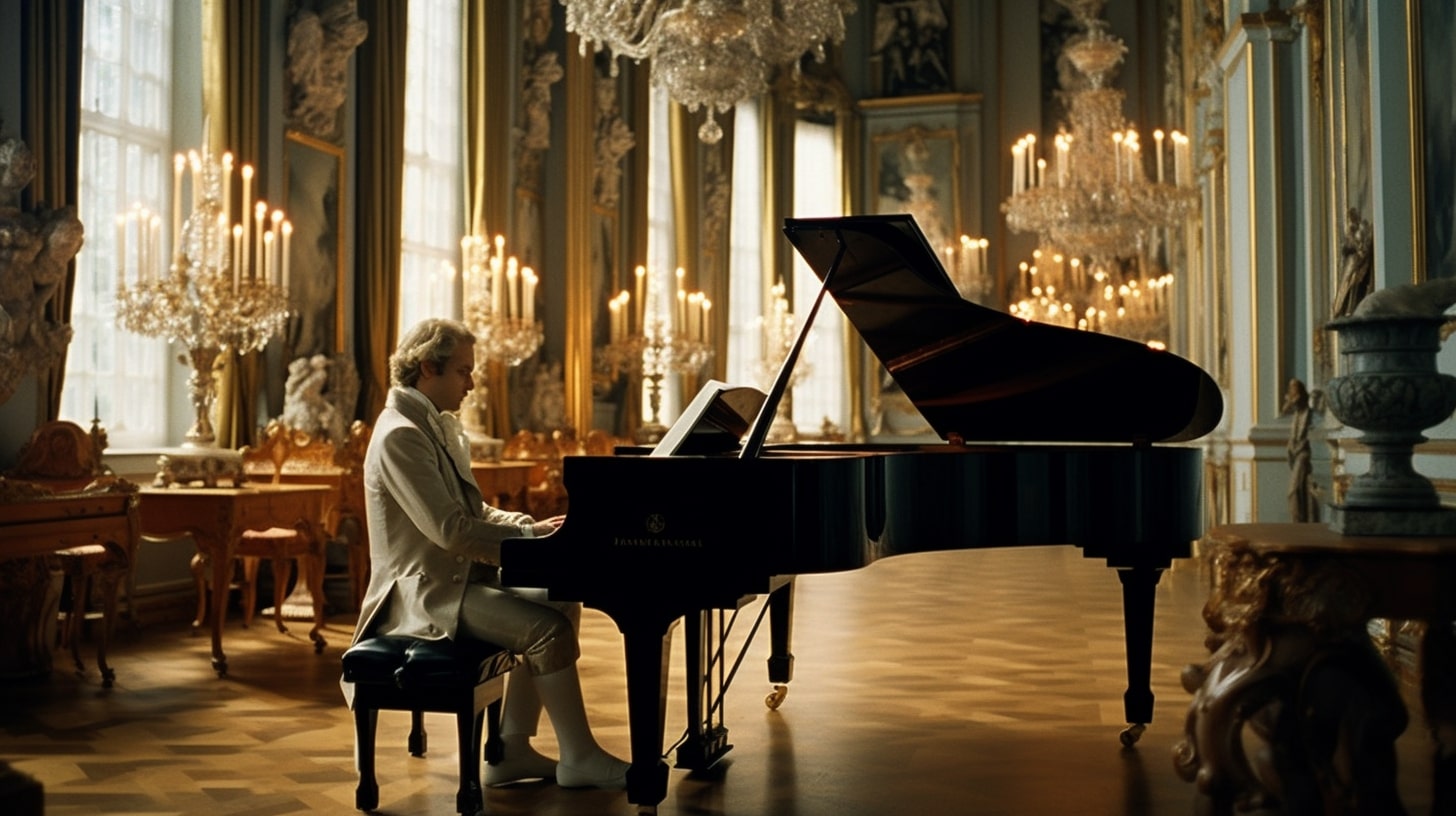Wolfgang Amadeus Mozart, a renowned composer of the classical era, was not only recognized for his remarkable compositions but also for his prodigious ability to play multiple instruments.
His extensive experience and skill with these instruments laid the foundation for his memorable compositions. As a composer, Mozart utilized a diverse range of instruments, creating a rich and vibrant sound that fascinates music enthusiasts today.
Understanding which instruments Mozart played offers insight into the development of his musical style and provides a greater appreciation for his lasting contribution to the world of music.
Contents
Mozart’s Musical Background
Child Prodigy
Wolfgang Amadeus Mozart was a prolific composer and performer of the classical era. Born in 1756 in Salzburg, he showed prodigious talent from a young age.
As a child, Mozart displayed remarkable abilities in various instruments, including the piano, violin, and harpsichord. With his father, Leopold Mozart, as his first instructor, he began composing and performing in front of European royalty by the age of five.
Influences and Mentors
Various composers and mentors significantly influenced Mozart’s musical journey. Johann Sebastian Bach, George Frideric Handel, and Joseph Haydn were among the musicians who profoundly impacted Mozart’s style and compositions.
Bach and Handel’s baroque style was a foundation for Mozart to build upon, leading him to develop his iconic classical style. His exposure to their works during his grand tour of Europe with his family helped shape his musical development.
Mozart also found inspiration in the works and friendship of Joseph Haydn. They admired each other’s music and exchanged ideas, leading to a fruitful musical relationship. It has been said that Mozart dedicated some of his string quartets to Haydn to honor their connection.
During his time in Vienna, Mozart fell in love with the city’s vibrant and thriving music scene. Immersing himself in the works of prominent Austrian and European composers, he further honed his skills and continued to create masterpieces across various musical genres.
Instruments Mozart Played
Keyboard Instruments
Mozart was proficient in various keyboard instruments, including the piano, organ, harpsichord, fortepiano, clavier, harmonium, and clavichord. He started learning the clavier at a young age, which served as the foundation for his skill in other keyboard instruments.
Mozart’s compositions for keyboard instruments are well-known, showcasing his mastery of them.
String Instruments
Mozart was also skilled in playing string instruments like the violin and viola. He began learning the violin when he was just four years old, and later, he played viola in various ensembles. Some of his most renowned works include violin concertos, violin and viola duets, as well as string trios and quintets.
Mozart often gave special attention to the viola parts in his compositions, providing the instrument with independent melodies and pushing its musical range capabilities.
Wind Instruments
While Mozart is not as prominently known for playing wind instruments, records show that he played various wind instruments such as the bassoon, oboe, flute, clarinet, horn, trumpet, and trombone.
His compositions for these instruments showcase his knowledge and understanding of their capabilities. For instance, Mozart’s compositions for the clarinet feature beautiful melodies and intricate passages, highlighting the instrument’s versatility and range.
To sum up, Mozart was a versatile musician, proficient in keyboard and string instruments, and had experience playing various wind instruments. His compositions for these instruments demonstrate his deep understanding and mastery of their unique capabilities, making him one of the most celebrated composers in the history of Western music.
Mozart’s Compositions and Performances
Operas
Wolfgang Amadeus Mozart was a prolific composer, and among his many works, his operas stand out as some of his most famous and well-regarded compositions. Throughout his life, Mozart composed more than 20 operas, with some of the most notable ones being “Don Giovanni,” “The Marriage of Figaro,” and “The Magic Flute.”
He traveled to various European cities during his career, such as Vienna, London, Paris, Prague, Milan, Munich, Rome, Bologna, and Mannheim, where he both composed and performed his operas.
Concertos
In addition to his operas, Mozart was also a gifted composer of concertos. He wrote numerous piano, violin, and wind concertos throughout his life. One of his most famous concertos is the “Sinfonia Concertante” for violin and viola in E-flat Major, K.364, showcasing his talent for combining multiple instruments in intricate and harmonious ways.
Regarding piano concertos, Mozart wrote an astounding number of 27 concertos, which were primarily composed in Vienna. His travels and interactions with the Stamitz family, a notable group of musicians in Mannheim, profoundly influenced his style.
Chamber Music
Mozart’s diverse musical talents also extended to chamber music, where he composed many sonatas, string quartets, and quintets. His chamber music was composed for a variety of instruments, including – but not limited to – the violin, viola, piano, and in certain cases, wind instruments such as the flute, clarinet, and bassoon.
Throughout his career, Mozart’s works encompassed different cities and cultures, and his chamber music can reflect the different places and influences he encountered during his lifetime.
Mozart: A Performer and Improviser
Piano Performances
Wolfgang Amadeus Mozart was a phenomenal pianist widely recognized for his contributions to the world of classical music. He began performing in public at the age of 6, often showcasing his skills on the keyboard. The harpsichord, a popular Baroque-era keyboard instrument, was said to be Mozart’s preferred choice for performing, accompanying, and composing in different genres and styles.
As a pianist, Mozart composed numerous piano concertos, sonatas, and other keyboard works that remain some of his most admired accomplishments.
Violin Performances
In addition to being a pianist, Mozart was also a skilled violinist. His aptitude for the violin is evidenced by his compositions, which include violin concertos and chamber music featuring the instrument.
Although he might not be primarily remembered as a violinist compared to his piano performances, Mozart’s abilities on the violin played a significant role in his development as a performer and composer.
Improvisation Skills
Mozart’s talent extended beyond playing composed pieces; he was also a remarkable improviser. His improvisation skills were showcased in his keyboard performances, where he would delight audiences with spontaneous renditions of popular tunes or his own compositions.
This ability to spontaneously create music was not only a testament to Mozart’s genius but also an essential skill for a musician in his time, as improvisation was a highly valued aspect of public performances.
Consequently, Mozart’s improvisation abilities further solidified his status as an influential performer in the world of classical music.
Mozart’s Connection to Other Composers and Cities
Historical Context
During his time, Wolfgang Amadeus Mozart (1756-1791) had several connections with notable composers and cities renowned for their musical heritage. He traveled extensively, visiting places like Munich, Vienna, Paris, and London, where he met and interacted with influential musicians of his time.
In Salzburg, his birthplace, Mozart began his career as a musician and developed his skills as a composer. But it was in Vienna where he formed relationships with some of the most well-known composers in history, such as Joseph Haydn and Ludwig van Beethoven.
Collaborations and Rivalries
Joseph Haydn and Mozart developed a strong friendship, with Haydn even declaring that Mozart was the greatest composer he’d ever known. The two held mutual admiration for each other’s work; Mozart dedicated a set of string quartets to Haydn, while Haydn was known to perform some of Mozart’s piano works.
Mozart’s relationship with Ludwig van Beethoven was less personal, but their meeting in Vienna significantly shaped Beethoven’s compositional style. Beethoven, who was just a teenager at the time, was deeply influenced by Mozart’s works and considered him a revered predecessor.
While in London, Mozart encountered the music of Handel and was reportedly moved by his oratorios, which influenced his later compositions. In Paris, he had some degree of success, notably performing his works on the piano built by Anton Walter, an esteemed piano maker.
One of Mozart’s favorite instruments was the viola, which played a significant role in his chamber music. He composed many works featuring the viola, including string quintets and his renowned Sinfonia Concertante (K.364). It is even speculated that Mozart preferred the viola over other instruments.
Rainer Connection
Though not directly related to Mozart, it is worth mentioning the Rainer family’s contribution to preserving and promoting Mozart’s legacy.
The Rainer family, known for their singing abilities, played a vital role in keeping Mozart’s music alive in the 19th and early 20th centuries. This dedication helped secure Mozart’s place in the history of Western classical music.
Mozart’s Legacy
Influence on Later Composers
Wolfgang Amadeus Mozart’s impact on the world of classical music is vast and enduring. As one of the most prolific and well-respected composers in Western music history, his contributions have shaped the development of classical music and influenced countless composers who came after him. Many notable composers, including Ludwig van Beethoven, Franz Schubert, and Johannes Brahms, have cited Mozart as a major inspiration for their own work.
Mozart had a unique ability to blend different musical styles and create a cohesive whole, which allowed him to navigate diverse genres and innovate within them. This skill inspired and influenced many composers who followed in his footsteps as they sought to emulate Mozart’s elegant and expressive style.
Modern Rediscovery
The modern rediscovery of Mozart’s work began in the early 19th century when his compositions started to become more readily available through printed scores and concert performances. This renewed interest in his music allowed musicians, scholars, and audiences to appreciate the depth and complexity of his work. The 20th century brought further interest in Mozart, with the advent of recorded music making it possible for wider audiences to access his compositions.
Today, Mozart’s music continues to captivate people worldwide, and he remains a celebrated figure in classical music history. His legacy is evident not only through the countless compositions he left behind but also in his lasting impact on the evolution of classical music and the many composers he has inspired.


